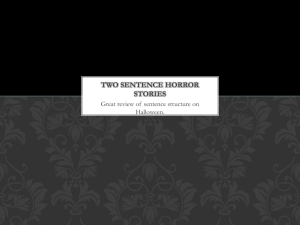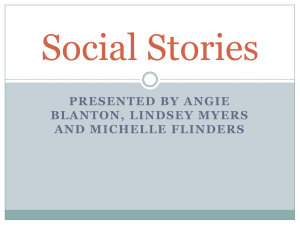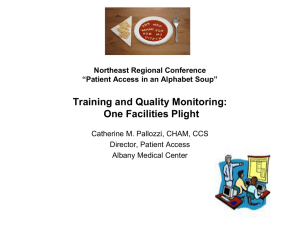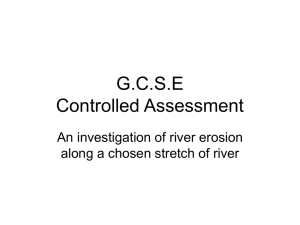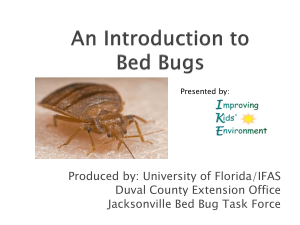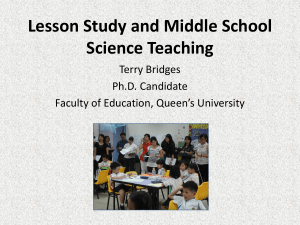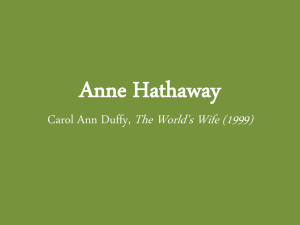Presentation on Education SA and the BEd: Prof Balfour
advertisement
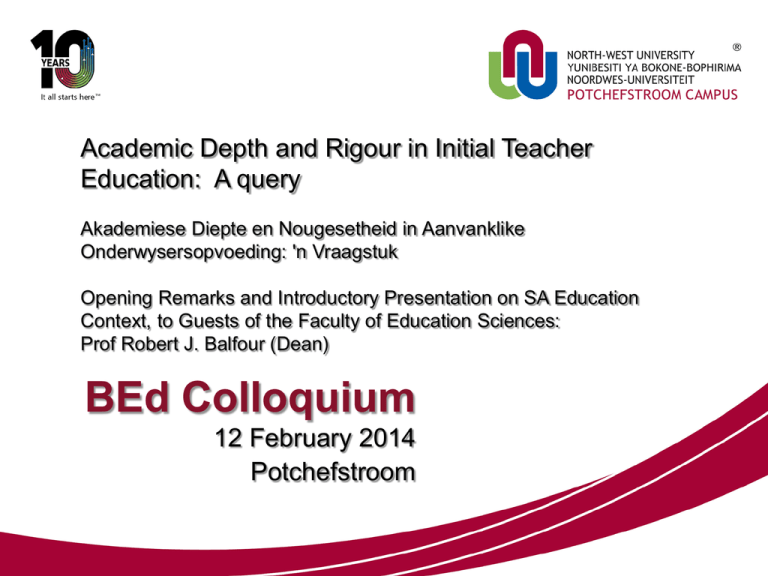
Academic Depth and Rigour in Initial Teacher Education: A query Akademiese Diepte en Nougesetheid in Aanvanklike Onderwysersopvoeding: 'n Vraagstuk Opening Remarks and Introductory Presentation on SA Education Context, to Guests of the Faculty of Education Sciences: Prof Robert J. Balfour (Dean) BEd Colloquium 12 February 2014 Potchefstroom School system in crisis… GRADE MATHEMATICS 2012 MATHEMATICS 2013 1 68 \60 2 57 59 3 41 53 4 37 37 5 30 33 6 27 39 9 13 14 School system in crisis… COMPARISON OF NSC CANDIDATES' PERFORMANCE IN SELECTED SUBJECTS Table 19: Candidates' performance at 30% and abo5e in selected subjects, 2010 - 2 0 1 3 % Achieved Achieved 30% & Above Wrote 2013 % Achieved Achieved 30% & Above Wrote 2012 % Achieved Achieved 30% & Above Wrote 2011 % Achieved Achieved 30% & Above 2010 Wrote Subjects (Full-Time) Mathematical Literacy 280 836 241 576 86.0 275 380 236 548 85.9 291 341 254 611 87.4 324 097 282 270 87.1 Mathematics 263 034 124 749 47.4 224 635 104 033 46.3 225 874 121 970 54.0 241 509 142 666 59.1 Physical Sciences 205 364 98 260 47.8 180 585 96 441 53.4 179 194 109 918 61.3 184 383 124 206 67.4 Higher Education not much better… CHE report : A Proposal for Undergraduate Curriculum Reform in South Africa: The Case for a Flexible Curriculum Structure Table 1: Graduation in regulation time, overall and by population group (%): 2006 first-time entering cohort, excluding UNISA graduation in regulation time (%) African Coloured Indian White All Attrition by end of regulation time (%) African Coloured Indian White All 3-year degrees 20 20 26 43 29 39 50 37 31 37 4-year degrees 30 28 31 47 36 41 47 43 33 39 3-year diplomas5 16 27 27 38 20 45 45 39 38 44 All 3- and 4-year qualifications 20 24 28 44 27 42 47 39 33 40 Higher Education not much better… CHE report : A Proposal for Undergraduate Curriculum Reform in South Africa: The Case for a Flexible Curriculum Structure The proportion of the intake into contact institutions that is wellenough prepared to complete undergraduate curricula within the intended time is small – only 27%, or roughly only one in every four. It also shows the high rate of attrition that has occurred by the end of regulation time: 40% overall By the end of the regulation time in all three qualification types, more students have been lost to failure and dropout than have graduated – more than twice as many in the case of African . and diploma students. Framing 'quality & rigour': perspectives offered by the Faculty of Education Sciences (internal) BEd Report 2012 SMK = Subject Matter Knowledge PCK = Pedagogical Content Knowledge There seems to be no common understanding with regard to how specialised SMK or specialised PCK should be taught. The jury is also still out as to whether the school subject should determine the content of the equivalent subject in the BEd curriculum or whether the academic discipline should determine the content of the equivalent subject in the BEd curriculum. The dominant view is that the school curriculum should not drive the content of the teacher-education curriculum. There should be a dialogue between the school and academic sister discipline to determine the content of the teacher-education curriculum. Pedagogical knowledge should be supported by a sound basis of content knowledge. Work-integrated learning is considered to be the most important means of bridging the gap between the world of teacher education and the world of the school. More from the FES- BEd Executive Report 2012 A National Perspective On Teacher Education Three basic models for teacher education: • the consecutive • the integrated • the concurrent BEd: Apart from UWC all the other universities follow their own version of the integrated model. UWC uses an adapted version of the consecutive model in the training of their education students. During the first and second years of training the academic subjects are completed with the faculties for basic subject disciplines, while the education or professional subjects are completed during the last two years with the faculty of education. FES-BEd Executive Report 2013… recommendations A culture of scholarship and strong communities of practice It is recommended that Faculty implement a programme to develop a culture of scholarship and strong communities of practice. Examples would typically include colloquia where topics such as academic scholarship, academic rigour, authentic school contexts, the intended, espoused and hidden curriculum, quality, and so on, can be debated. Disciplinary knowledge and depth of knowledge 1. Subject groups should critically evaluate the scope and depth of the disciplinary knowledge that is being taught in every academic subject or module; knowledge should be increased and/or deepened where and when necessary; FES- BEd Executive Report 2013: more recommendations about academic content and appropriate level… 2. Specialists in academic disciplines (from the faculties for related disciplines, whether from the NWU or other universities) should participate in the assessment and evaluation of the academic subjects that are included in the teacher education programme and such assessment and evaluation should form part of a particular subject group’s assessment and evaluation; 3. The academic rigour of the content being taught should be improved where necessary; 4. An assessment should be made of students’ content knowledge, depth of knowledge and, in particular, higher-order thinking or cognitive skills in novel and creative ways, in order to encourage them to develop their own notes and summaries and to develop their own, personal self-directed learning abilities. JET Report on the NWU BEd: 2013 Content Knowledge Concern was raised by several staff members that the courses offered by the institution “are too closely tied to the national curriculum” and too closely linked to whatever happens to be in the school curriculum. The rationale provided for this close linkage is so that “students will be more familiar with what they have to teach during their practicals”. However, for some staff, this presents a barrier in their attempts to offer content comparable to that offered in the mother faculties. JET Report on generic and specific pedagogic content knowledge… Pedagogy Many staff members acknowledge the importance of PCK but the conception of teaching within this curriculum is consistently presented as a generic activity that is applied to various subjects. In the generic courses students are taught aspects like conceptualization of lessons, assessment strategies, teaching strategies and learning support in a generic way. Students and staff are expected to apply these generic strategies in their subject/phase specialization. However, there is very little contact between the staff offering these core courses (from the School of Education) with the phase and subject methodologists (from the School of Curriculum Studies), and so the potential for collaboration is not yet adequately exploited. Staff well aware of this limitation, but seem unsure of how to initiate conversations, always reluctant to step on one another’s toes. JET Report on NWU BEd 2013: some data Table 3: Perceptions of major challenges to producing high-quality teachers Teacher Educator Number 2 11 5 20 3 12 14 4 10 19 Large classes – less individual attention, especially during microteaching 1 1 1 Poor literacy, conceptual knowledge/ understanding of students entering programme Limited time available to make powerful interventions Students entering teacher education who don’t really want to be teachers / low admission criteria for teacher education 1 1 1 1 1 Staff workload: High teaching, marking loads Problems within the institutional structure; the way we structure / run our teacher education programmes 1 1 1 1 1 1 1 1 1 1 1 Questions to consider for the BEd Colloquium • How do we understand academic depth in relation to specialist content knowledge? • How do we measure academic rigour in relation to pedagogic content knowledge (pck) and specialist content knowledge (sck)? • What kinds of measures do we need to put into place to assure the quality of pck and sck? • What kinds of academic conversations do we need, and with which stakeholders, in relation to the proper benchmarking of quality pck and sck? • How do we identify, select and include stakeholders in QA mechanisms? FES- BEd Colloquium 12 Feb 2014 It gives us as Faculty great pleasure to Welcome Prof Hamsa Venkat to address the Colloquium on 12 Feb 2014. Prof Venkat holds the position of SA Numeracy Chair at Wits – focused on a 5-year research and development project in primary mathematics. Her work in South Africa has been in the areas of Mathematical Literacy and Primary Mathematics teaching and learning. The Numeracy Chair work involves research, and the development and trialling research-based interventions across ten government primary schools in one Gauteng district. The project runs from 2011-15. Prior to this, Hamsa was based in London for many years, working initially as a high school mathematics teacher in London comprehensive schools, before moving into teacher education at the Institute of Education and research in mathematics education at King’s College. She obtained her PhD at Kings College London and is the winner of the 2005 British Educational Research Association dissertation award for making the most significant doctoral contribution to research in education in 2004. Thank you
